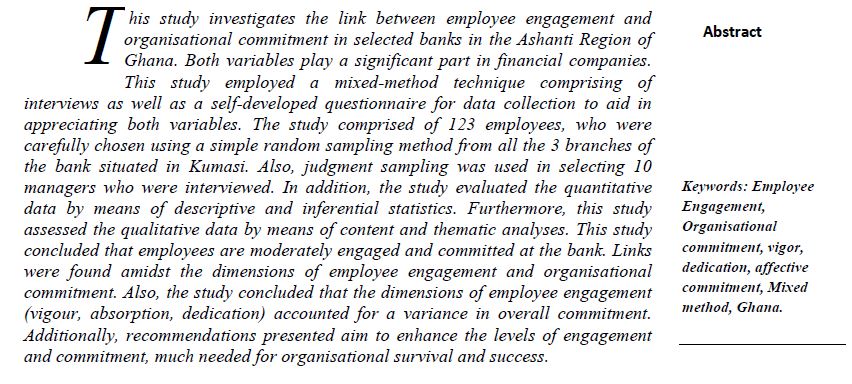The Relationship Between Employee Engagement and Organisational Commitment: A Symbiotic Relationship in a Banking Environment In Ghana or Not?
Abstract
This study investigates the link between employee engagement and organisational commitment in selected banks in the Ashanti Region of Ghana. Both variables play a significant part in financial companies. This study employed a mixed-method technique comprising of interviews as well as a self-developed questionnaire for data collection to aid in appreciating both variables. The study comprised of 123 employees, who were carefully chosen using a simple random sampling method from all the 3 branches of the bank situated in Kumasi. Also, judgment sampling was used in selecting 10 managers who were interviewed. In addition, the study evaluated the quantitative data by means of descriptive and inferential statistics. Furthermore, this study assessed the qualitative data by means of content and thematic analyses. This study concluded that employees are moderately engaged and committed at the bank. Links were found amidst the dimensions of employee engagement and organisational commitment. Also, the study concluded that the dimensions of employee engagement (vigour, absorption, dedication) accounted for a variance in overall commitment. Additionally, recommendations presented aim to enhance the levels of engagement and commitment, much needed for organisational survival and success.
Downloads
References
Ahlowalia, S., Tiwary, D., & Jha, A. (2014). Employee engagement: A structured theoretical review. The International Journal of Business and Management, 2(6), 309- 313.
Ahmad, A. (2018). The relationship among job characteristics organizational commitment and employee turnover intentions: A reciprocation perspective. Journal of Work-Applied Management, 10(1), 74-92.
Ahmadi, F. (2011). Relationship between professional ethics and organizational commitment. International Journal of Learning and Development, 1, 178-190.
Al Mehrzi, N., & Singh, S.K. (2016). Competing through employee engagement: A proposed framework. International Journal of Productivity and Performance Management, 65(6), 831-843.
Albdour, A.A., & Altarawneh, I.I. (2014). Employee engagement and organizational commitment: Evidence from Jordan. International Journal of Business, 19(2), 192-212.
Ambar, K., Saba, K., Asma W., Yasir, A.F., & Ayesha, N. (2015). Relationship between organizational commitment, employee engagement and career satisfaction: A case of university of Gujrat. European Journal of Business and Social Sciences, 3(11), 172 – 183.
Anttila, E. (2015). Components of organizational commitment–A case study consisting managers from Finnish industrial company. Master’s dissertation. University of Tampere, School of Education.
Attridge, M. (2009). Measuring and managing employee work engagement: A review of the research and business literature. Journal of Workplace Behavioral Health, 24(4), 383-398.
Bakker, A.B., & Demerouti, E. (2008). Towards a model of work engagement. Career Development International, 13, 209–223.
Boikanyo, D.H. (2012). An exploration of the effect of employee engagement on performance in the petrochemical industry. Doctoral dissertation. North-West University, Potchefstroom Campus.
Burke, R.J., & El-Kot, G. (2010). Work engagement among managers and professionals in Egypt: Potential and antecedents. African Journal of Economic and Management Studies, 1(1), 42-60. Cassar, V., & Briner, R. (2011). The relationship between psychological contract breach and organizational commitment: Exchange imbalance as a moderator of the mediating role of violation. Journal of Vocational Behaviour, 78, 283-289.
Dachapalli, L.A.P. (2016). An investigation into the levels of job satisfaction and organizational commitment amongst South African police services employees. Problems and Perspectives in Management, 14(3), 76-84.
De la Rocha, A.M. (2015). The relationship between employee engagement and survey response rate with union membership as a moderator. Master's dissertation. San José State University.
Eghlidi, F.F., & Karimi, F. (2016). The relationship between components of work engagement and organizational commitment of female employees of University. International Journal of Human Resource Studies, 6(3), 63-73. Ferreira, N. (2012). Constructing a psychological career profile for staff retention. Doctoral dissertation. University of South Africa, Pretoria.
Field, L.K., & Buitendach, J.H. (2011). Happiness, work engagement and organisational commitment of support staff at a tertiary education institution in South Africa. South African Journal of Industrial Psychology, 37(1), 68–77. Frese, M. (2008). The word is out: We need an active performance concept for modern workplaces. Industrial and Organizational Psychology, 1(1), 67-69.
García-Cabrera, A.M., & García-Soto, M.G. (2012). Organizational commitment in Multinational corporation subsidiary top managers: Antecedents and consequences. The International Journal of Human Resource Management, 23(15), 3151-3177.
Gonring, M.P. (2008). Customer loyalty and employee engagement: An alignment for value. The Journal of Business Strategy, 29(4), 29–40.
Harter, J., Schmidt, F., Asplund, J., Killham, E., & Agrawal, S. (2010). Causal impact of employee work perceptions on the bottom line of organisations, Perspectives on Psychological Science, 5(4), 378-389.
Hlongwane, V.C., & Ledimo, O. (2015). Generational differences on work engagement levels of government healthcare institution employees. Journal of Governance and Regulation, 4(1), 245-253.
Jayarathna, D.Y. (2016). Organizational commitment: A case in academia. International Journal of Academic Research and Development, 1(7), 40-45.
Kamau, R.W. (2015). Factors influencing employee commitment and its impact on organizational performance: A case study of Kenya airports authority. Doctoral dissertation. United States International University-Africa.
Karimi, N.B. (2016). The relationship between employee training and organizational commitment in the ministry of energy and petroleum, Kenya. Published master’s degree dissertation.
Kazimoto, P. (2016). Employee engagement and organizational performance of retails enterprises. American Journal of Industrial and Business Management, 6(4), 516-525.
Khalid, A., Khalid, S., Waseem, A., Farooqi, Y.A., & Nazish, A. (2015). Relationship between organizational commitment, employee engagement and career satisfaction: A case of University of Gujrat. European Journal of Business and Social Sciences, 3(11), 172-183.
Klette, A. (2017). Mental toughness, job demands and job resources: testing the effects on engagement and stress of South African emergency personnel. Doctoral dissertation. Stellenbosch: Stellenbosch University.
Kompaso, S.M., & Sridevi, M.S. (2010). Employee engagement: The key to improving performance. International Journal of Business and Management, 5(12), 89-96.
Kruse, K. (2012). What Is Employee Engagement? Retrieved from https://www.forbes.com/sites/kevinkruse/employee-engagement-what-and-why Luz, C. M. D. R., de Paula, S. L., & de Oliveira, L. M. B. (2018). Revista de Gestão. Revista de Gestão, 25(1), 84-101.
Macey, W.H., & Schneider, B. (2008). The meaning of employee engagement. Industrial and Organizational Psychology, 1(1), 3-30.
Markovits, Y., Boer, D., & Van Dick, R. (2014). Economic crisis and the employee: The effects of economic crisis on employee job satisfaction, commitment, and self-regulation. European Management Journal, 32(3), 413-422.
Martín, S.S. (2008). Relational and economic antecedents of organisational commitment. Personnel Review, 37(6), 589-608.
Martín, S.S. (2008). Relational and economic antecedents of organisational commitment. Personnel Review, 37(6), 589-608. Memari,
N., Mahdieh, O., & Marnani, A.B. (2013). The impact of organizational commitment on employees’ job performance. A study of Meli bank. Interdisciplinary Journal of Contemporary Research in Business, 5(5), 164-171. Meyer, J. P., & Allen, N. J. (1991). A three-component conceptualization of organizational commitment. Human resource management review, 1(1), 61-89.
Mokaya, S.O., & Kipyegon, M.J. (2014). Determinants of employee engagement in the Banking industry in Kenya; case of cooperative bank. Journal of Human Resources Management and Labor Studies, 2(2), 187-200.
Mouhamadou, T.S. (2015). Relationship between organizational commitment and turnover intentions among healthcare internal auditors (Unpublished dissertation). Walden University.
Naik, N.A. (2012). Organisational culture and organisational commitment in a consulting firm. Master’s dissertation. University of South Africa.
Newman, A., Thanacoody, R., & Hui, W. (2011). The impact of employee perceptions of training on organizational commitment and turnover intentions: A study of multinationals in the Chinese service sector. The International Journal of Human Resource Management, 22(8), 1765-1787.
Norizan, I. (2012). Organizational commitment and job satisfaction among staff of higher learning education institutions in Kelantan. Doctoral dissertation. Universiti Utara Malaysia.
Osemeke, M. (2016). Identification of determinants of organizational commitment and employee job satisfaction. African Research Review, 10(2), 81-102.
Ram, P., & Prabhakar, G. V. (2011). The role of employee engagement in work-related outcomes. Interdisciplinary Journal of Research in Business, 1(3), 47-61.
Ramakhula-Mabona, R. (2014). The relationship between organizational commitment and turnover intentions. Doctoral dissertation. University of KwaZulu-Natal, Durban.
Riggle, R.J. Endmondson, D.R., & Hansen, J.D. (2009). A metal-analysis of the relationship between perceived organizational support and job outcomes: 20 years of research. Journal of Business Research, 62(2), 1027-1030.
Robinson, J. (2018). The 3 Engines of Employee Engagement. Worktolive.info. Retrieved from https://www.worktolive.info/blog/bid/354012/The-3-Engines-of-Employee-Engagement
Saks, A.M., & Gruman, J.A. (2014). What do we really know about employee engagement? Human Resource Development Quarterly, 25(2), 155-182.
Samudi, S., Slambolchi, A., & Mobarakabadi, H. (2016). A literature review on organizational commitment: a comprehensive summary. Applied Mathematics in Engineering, Management and Technology, 4(3), 47-57.
Satardien, M. (2014). Perceived organizational support, organizational commitment and turnover intentions amongst employees in a selected company in the aviation industry. Master’s dissertation. University of the Western Cape.
Sayani, G., & Swamy, D.R. (2014). A literature review on organizational commitment – A comprehensive summary. International Journal of Engineering Research and Applications, 4(12), 04-14.
Schaufeli, W.B. & Salanova. M. (2007a). Efficacy or inefficacy, that’s the question: Burnout and engagement, and their relationships with efficacy beliefs. Anxiety, Stress & Coping: An International Journal, 20, 177–196.
Shekari, H. (2015). Evaluating the three dimensions of work engagement in social security organization of Yazd province in Iran. Journal of Educational and Management Studies, 5(3), 168-174.
Simons, J.C., & Buitendach, J.H. (2013). Psychological capital, work engagement and organisational commitment amongst call centre employees in South Africa. South African Journal of Industrial Psychology, 39(2), 1-12.
Somunoglu, S., Erdem, E., & Erdem, U. (2012). Organizational commitment in healthcare sector workers: Sample of Denizli city. HealthMED, 6, 2362-2369.
Sonnentag, S. (2011). Research on work engagement is well and alive. European Journal of Work and Organizational Psychology, 20(1), 29–38.
Sonnentag, S., & Niessen, C. (2008). Staying vigorous until work is over: The role of trait vigour, dayspecific work experiences and recovery. Journal of Occupational and Organizational Psychology, 81(3), 435-458.
Steyn, R. (2011). Optimism, self-efficacy and meaningfulness: towards a salutogenic model of occupational wellbeing. Unpublished master’s thesis. University of Stellenbosch, South Africa.
Truss, K., Soane, E., Edwards, C.Y.L., Wisdom, K., Croll, A., & Burnett, J. (2006). Working life: Employee attitudes and engagement 2006. London: Chartered Institute of Personnel and Development Publishing. Turnbull, C. (2011). An Investigation of Work Motivation: Typologies of 21st century business students. Doctoral dissertation, Universitat Ramon Llull.
Vandenberghe, C., & Tremblay, M. (2008). The role of pay satisfaction and organizational commitment in turnover intentions: A two-sample study. Journal of Business and Psychology, 22(3), 275-286.
Vecina, M.L., Chacón, F., Sueiro, M., & Barrón, A. (2012). Volunteer engagement: Does engagement predict the degree of satisfaction among new volunteers and the commitment of those who have been active longer? Applied Psychology, 61(1), 130-148.
Wefald, A.J., & Downey, R.G. (2009). Job engagement in organizations: fad, fashion, or folderol? Journal of Organizational Behavior, 30(1), 141-145












